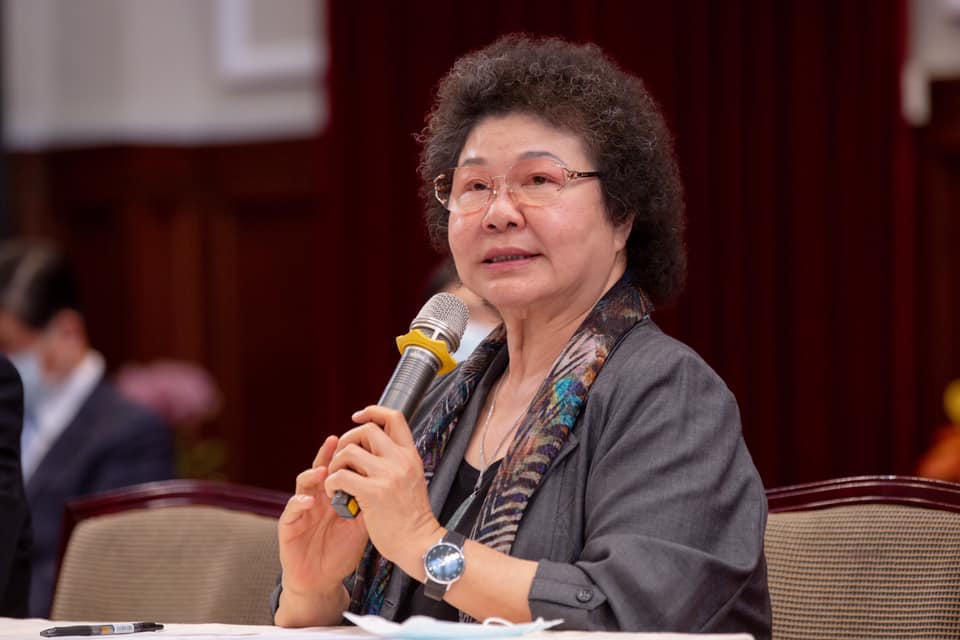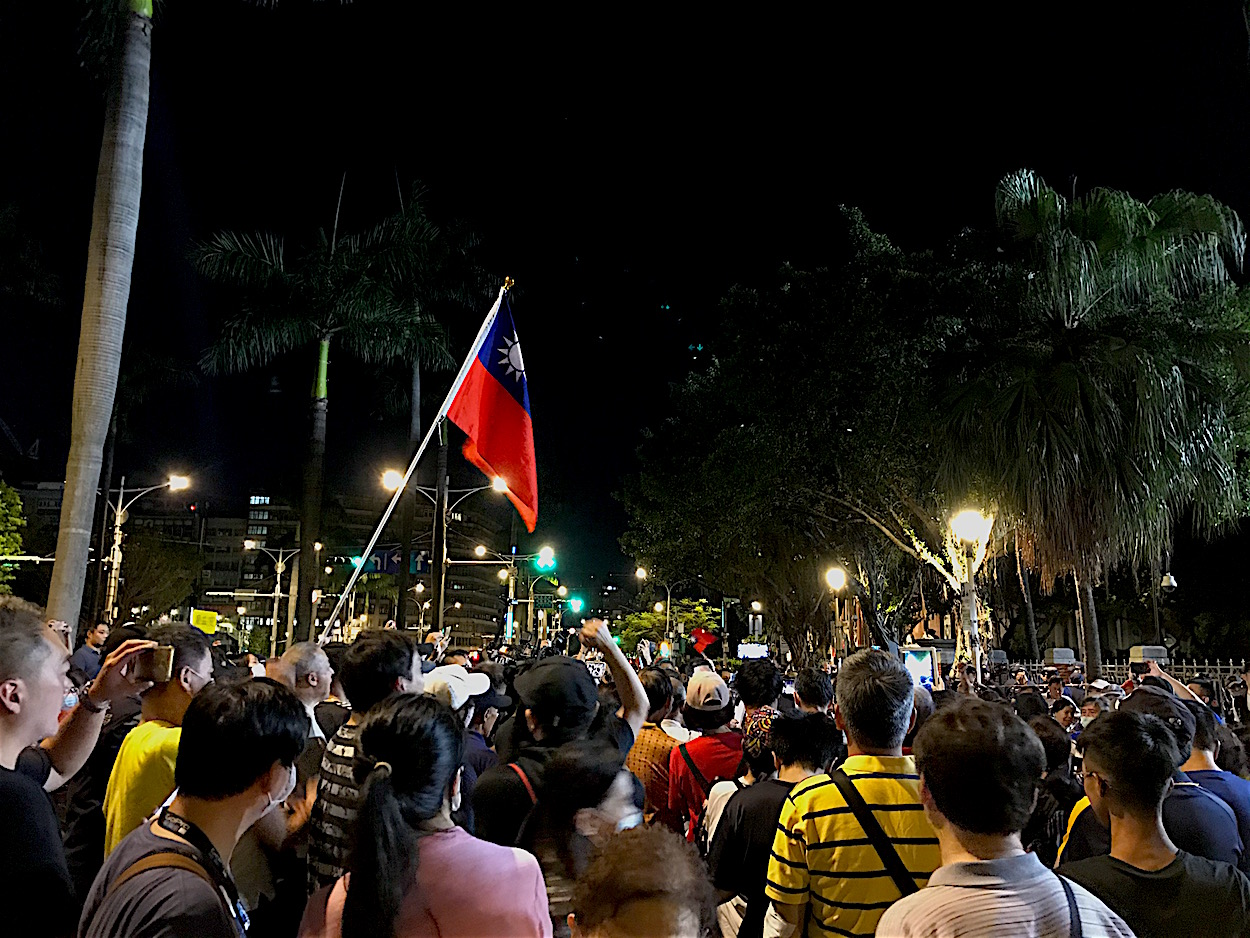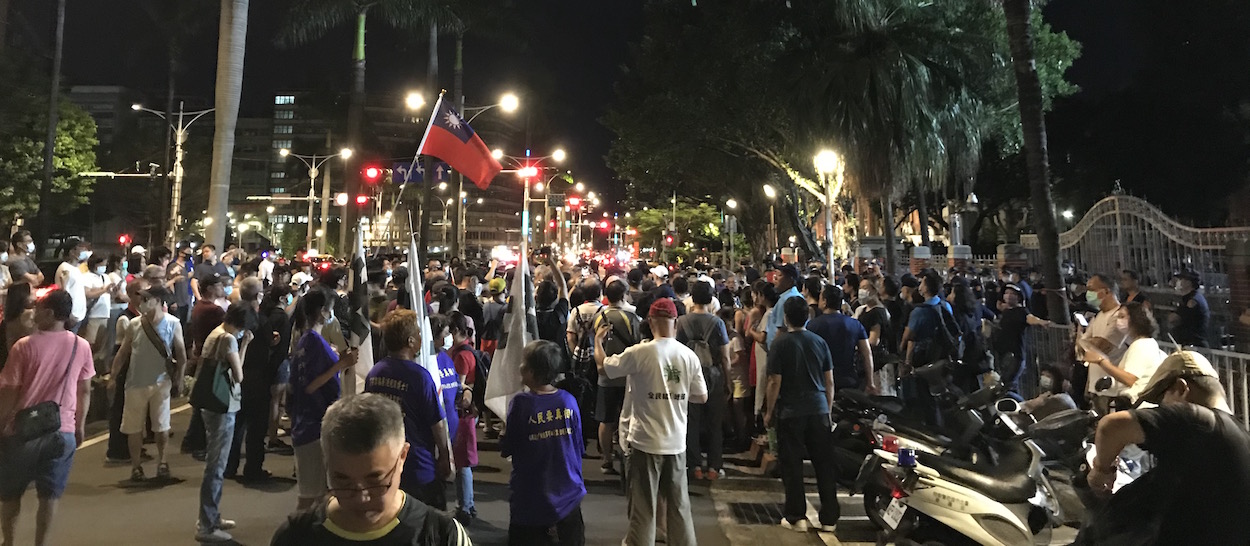by Brian Hioe
語言:
English
Photo Credit: Brian Hioe
TWENTY KMT LEGISLATORS occupied the assembly chambers of the Legislative Yuan this afternoon to protest the Tsai administration’s Control Yuan nominations. The occupation began at around 5 PM, with KMT legislators barricading the doors of the Legislative Yuan with chairs and other objects, occupying and writing slogans on the speaker’s podium. The action was timed to take place before talks scheduled to take place tomorrow morning in the legislature to discuss Control Yuan nominations, which may now be postponed.
The KMT currently has 38 legislators in the Legislative Yuan, meaning that over half of the current slate of KMT legislators engaged in this action. The KMT legislators currently inside of the Legislative Yuan include Chiang Wan-an, Lin Yi-hwa, Tseng Ming-chung, Yeh Yu-lan, and others.
KMT legislators inside of the Legislative Yuan. Film credit: Hung Meng-kai/Facebook
Subsequently, members of the KMT such as village chief Wu Yu-quan—an online personality known as “Almond Brother” with close to 140,000 followers on Facebook—called on the public to surround the Legislative Yuan. By 9 PM, around 200 KMT supporters had gathered around the Legislative Yuan, declaring that they intended to storm the legislature to protect the KMT legislators inside if police attempted to remove them by force. 300 police officers were deployed to the area around the Legislative Yuan and razor wire barriers were set up outside of the building. The “800 Heroes,” a pan-Blue group composed of former military veterans with a history of engaging in violence against journalists, pedestrians, police, and others, has called for supporters to gather outside of the legislature at 7 AM on Monday.
In particular, the KMT legislators were protesting against the nomination of Chen Chu as head of the Control Yuan. Chen Chu was previously the mayor of Kaohsiung, before resigning to take up a post as secretary-general of the Presidential Office in April 2018.
Chen Chu, a veteran politician of the DPP, began her political career as a prominent political dissident of the dangwai movement, when the KMT ruled over Taiwan during the authoritarian period. The dangwai movement had its aim to form a second political party outside of the KMT’s one-party dictatorship. Chen was one of the “Kaohsiung Eight”, eight prominent leaders of the dangwai movement who were arrested in the course of the December 1979 Kaohsiung Incident. After Chen’s arrest, she served six-and-half years in jail.
 Chen Chu. Photo credit: Chen Chu/Facebook
Chen Chu. Photo credit: Chen Chu/Facebook
By contrast, the KMT has long alleged that Chen Chu is politically corrupt and claimed that, behind the scenes, that she is manipulating DPP factions. As such, members of the KMT have stated that they will not accept Chen Chu taking up a post as the head of the Control Yuan, an official government oversight body which is one of Taiwan’s five branches of government.
However, one generally suspects that the KMT’s longstanding animus against Chen Chu is at least in part because they begrudge her for her history of activism against authoritarian rule. Indeed, one notes that Chen’s history of democracy activism was never brought up in any of the speeches outside of the Legislative Yuan tonight, with Chen instead constantly accused of political corruption or of being a secretive political manipulator behind Tsai Ing-wen’s throne. In order to signal that the Control Yuan would be non-partisan, Chen recently resigned from the DPP, ending decades of membership in the party.
This is one of the many ways in which the KMT has failed to reckon with its authoritarian past. The KMT’s contemporary accusations against the DPP that it is engaging in a “Green Terror,” far worse than its “White Terror” is another example of how the KMT still denies its past actions. After all, the White Terror left tens of thousands dead, whereas one wonders where the tens of thousands of dead during Tsai Ing-wen’s four years in office are.
 The crowd outside of the Legislative Yuan tonight. Photo credit: Brian Hioe
The crowd outside of the Legislative Yuan tonight. Photo credit: Brian Hioe
It is somewhat unusual as to why the KMT has decided to stake so much political capital on attacking the DPP over the issue of Control Yuan nomination. Notably, the Tsai administration previously caused controversy among members of the pan-Green camp for attempting to appoint KMT member and former Taitung county commissioner Justin Huang as deputy chief of the Control Yuan as a gesture toward bipartisanship, something that the KMT saw as an attempt to create internal splits within the party.
The Tsai administration is currently enjoying a wave of popularity for its able handling of the COVID-19 pandemic, though indications suggest that the Tsai administration’s honeymoon period is over. The KMT may simply be desperate for issues on which to attack the DPP. However, it is also possible that KMT legislators are primarily trying to play to their party base with their actions.
In the years since the 2014 Sunflower Movement, the KMT or affiliated pan-Blue political actors have made many attempts to occupy the Legislative Yuan, something that academic Stéphane Corcuff has termed the “mimetic distortion” of the Sunflower Movement. Members of the KMT seem to believe that in imitating what they see as a successful pan-Green political tactic, they will be able to attract the support of the Taiwanese public in a manner similar to the Sunflower Movement.
 Photo credit: Brian Hioe
Photo credit: Brian Hioe
Such efforts have not been successful in the past. But today’s occupation of the Legislative Yuan has seen a greater amount of attention compared to past occupation attempts because this occupation attempt was initiated directly by KMT legislators themselves rather than by pan-Blue political groups, as well as because it involved over half of the KMT’s total slate of legislators.
It is to be questioned as to how the DPP will respond to the occupation. Because the occupation is not likely to grow in size or attract considerable support, it is probable that the DPP will sit it out rather than try to remove Chen Chu as some show of bipartisanship. Chen herself has stated in comments that members of the KMT were “defaming” her.
At the same time, the actions of KMT legislators has provoked some mockery. Much mockery has focused on video of KMT legislator Yeh Yu-lan complaining about the lack of air conditioning in the legislature, or of images of KMT legislators with electric fans, towels, and ice cubes in the legislature when Sunflower Movement occupiers endured hot, stuffy conditions during their one-month occupation of the Legislative Yuan.
Facebook post by DPP legislator and former Sunflower Movement activist Lai Pin-yu joking about the best places to sleep in the Legislative Yuan
Likewise, DPP legislator Lai Pin-yu, the youngest current legislator at age 28 and a former Sunflower Movement activist, joked on Facebook that she had a box of suncakes in her office—referencing an incident in which student activists ate suncakes in the office of Executive Yuan deputy secretary-general Hsiao Chia-chi during the attempted Executive Yuan occupation during the Sunflower Movement. Lai also wrote a Facebook post commenting on which were the best places to sleep in the Legislative Yuan. Both comments went viral, with the latter post attracting 7,500 likes.
With some chatter of plans for an attempt to occupy the Legislative Yuan by KMT supporters outside the Legislative Yuan, it remains to be seen as to whether they will engage in any form of direct action later tonight. However, either way, it should be apparent that the Legislative Yuan occupation marks the death knell for any attempts to reform the KMT by party chair Johnny Chiang.
Chiang was elected as chair of the KMT in March this year, vowing to change the party’s pro-China image to win back the support of young people, and to rise above partisan mudslinging in Taiwanese political culture. However, in the three months since Chiang’s election, Chiang has not only failed to make the KMT appear any less pro-China, but also failed to change the tenor of the KMT’s attacks on the pan-Blue camp..
Post by the KMT’s official Facebook page calling for Chen Chu’s removal as head of the Control Yuan
For example, after the successful recall of Kaohsiung mayor Han Kuo-yu earlier this month by large margins, Chiang alleged that this political result was because of the political manipulations of the Tsai administration using its shadowy Internet “cyber-army”, rather than because of Han’s poor governance as mayor of Kaohsiung. Han, the KMT presidential candidate in 2020 elections, is still highly popular among deep Blue members of the KMT and Chiang likely did not wish to offend pan-Blue traditionalists who already see Chiang as having compromised too much on party fundamentals.
But with a majority of the KMT’s legislators engaging in an occupation of the Legislative Yuan over an issue that is not likely to have very much resonance with the Taiwanese public at large, this represents that Chiang’s reform attempts have failed disastrously. Chiang himself was among those to express support for the occupation, not only through posting a statement on the KMT’s official Facebook page, but also by visiting the occupation to conduct a live stream. Going forward, one can expect little from the KMT’s attempts at reform under Chiang’s leadership.

